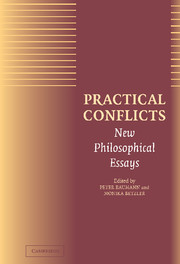Book contents
- Frontmatter
- Contents
- Foreword
- 1 Introduction: Varieties of Practical Conflict and the Scope of Practical Reason
- 2 Willing the Law
- 3 The Myth of Egoism
- 4 Thinking about Conflicts of Desire
- 5 Putting Together Morality and Well-Being
- 6 The Second Worst in Practical Conflict
- 7 Personal Practical Conflicts
- 8 Sources of Practical Conflicts and Reasons for Regret
- 9 Conflicting Values and Conflicting Virtues
- 10 Involvement and Detachment: A Paradox of Practical Reason
- 11 Outcomes of Internal Conflicts in the Sphere of Akrasia and Self-Control
- 12 Are There Insolvable Moral Conflicts?
- 13 Moral Dilemmas of Transitional Justice
- 14 Do Conflicts Make Us Free?
- List of Contributors
- Name Index
- Subject Index
- References
7 - Personal Practical Conflicts
Published online by Cambridge University Press: 02 December 2009
- Frontmatter
- Contents
- Foreword
- 1 Introduction: Varieties of Practical Conflict and the Scope of Practical Reason
- 2 Willing the Law
- 3 The Myth of Egoism
- 4 Thinking about Conflicts of Desire
- 5 Putting Together Morality and Well-Being
- 6 The Second Worst in Practical Conflict
- 7 Personal Practical Conflicts
- 8 Sources of Practical Conflicts and Reasons for Regret
- 9 Conflicting Values and Conflicting Virtues
- 10 Involvement and Detachment: A Paradox of Practical Reason
- 11 Outcomes of Internal Conflicts in the Sphere of Akrasia and Self-Control
- 12 Are There Insolvable Moral Conflicts?
- 13 Moral Dilemmas of Transitional Justice
- 14 Do Conflicts Make Us Free?
- List of Contributors
- Name Index
- Subject Index
- References
Summary
Neither in social order, nor in the experience of an individual, is a state of conflict the sign of a vice, or a defect, or a malfunctioning.
Stuart HampshireThis preliminary reflection about practical conflicts confronting single agents does little to solve the problems conflicts create. Rather, it attempts to explain what conflicts are and what questions they raise. I suggest that we have two distinct notions of single-agent conflicts reflecting two distinct theoretical questions. The first concerns the possibility of there being a right action in conflict situations. It is the question of whether and, if so, how reasons deriving from different concerns or affecting different people can be of comparable strengths. The second concerns a sense that there is something unfortunate about conflicts and that when facing conflicting options just taking the best or the right one is not sufficient. I offer (in outline) an answer to the second question but nothing about the first.
PRACTICAL CONFLICTS: INITIAL CHARACTERIZATION
What are practical conflicts? A fairly common way of characterizing them has it that
(Initial 1st Definition): Agents face a practical conflict when they are in a situation in which they have reasons to perform two acts (or more) such that they can perform either but not both.
- Type
- Chapter
- Information
- Practical ConflictsNew Philosophical Essays, pp. 172 - 196Publisher: Cambridge University PressPrint publication year: 2004
References
- 10
- Cited by

